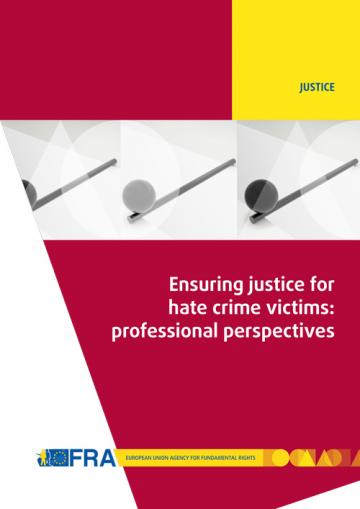Help us make the FRA website better for you!
Take part in a one-to-one session and help us improve the FRA website. It will take about 30 minutes of your time.

Ensuring justice for hate crime victims: professional perspectives
The report also presents promising developments across the EU, and identifies the institutional preconditions necessary to develop effective policies against hate crime. By focusing on the perspective of professionals, the report offers important field-based insights that can help strengthen efforts to empower victims of crime.
Previous FRA research explored the issue of hate crime victims being reluctant to report – or prevented from reporting – their victimisation, and the reasons victims gave to account for these difficulties. It revealed disquieting levels of hate crime against individuals who belong to ethnic or national minorities, persons of Jewish background and persons who are gay, lesbian, bisexual or transgender (LGBT). While it is essential for EU Member States to take measures to prevent such crimes, it is equally important to ensure that victims have access to justice: that they are able to report to competent institutions, that the crimes are promptly and effectively investigated, that perpetrators are punished and that victims receive the support they need.
The earlier research did not cover professionals’ views on the complexities that victims face in reporting, nor the organisational and procedural factors that impede victims’ access to justice and the proper recording of hate crime. The present report seeks to fill this gap. It presents professionals’ views on the situation on the ground: how victims access justice in Member States and what prevents them from doing so, as well as the role of the police in recording offences and acknowledging victims of hate crime. Building on FRA’s extensive research on the rights and situation of victims of crime,3 it both focuses on victims of hate crime and presents voices from within institutions that represent the entire criminal justice system: criminal courts, public prosecutors, police officers, as well as non-governmental organisations (NGOs) supporting hate crime victims. In total, 263 interviews were carried out in all EU Member States between the second half of 2013 and early 2014.
Offering insights into the reporting and recording of hate crimes from the perspective of professionals, this report analyses the specific factors that affect how and why hate crime victims do or do not seek justice and how and why victims’ efforts to be acknowledged as victims of severe discrimination ultimately are – or are not – successful. Understanding the obstacles to victims’ access to justice will allow EU institutions and Member States to adopt targeted measures that facilitate such access and make victims’ fundamental right to access justice a reality.
